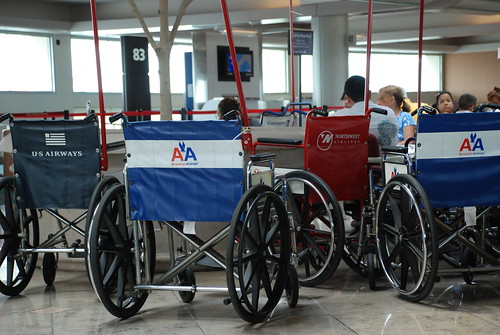Accessible International Travel for Wheelchair Users
The world is becoming more aware of people with disabilities.You can hail an accessible cab in London, take an elevator up to the Eiffel Tower, and sleep in a wheelchair-accessible villa in Spain.
Traveling in a wheelchair to a foreign country is challenging, but not impossible.
“Once you leave home, things will be different,” says travel agent Ann Litt, who owns Undiscovered Britain and arranges customized accessible trips. “Be a little flexible and roll with the punches, and it’s absolutely worth going abroad.”
Research the Destination
Unless you are on a cruise or an organized tour with a guide, don’t try to see multiple countries on one trip advises Christine Arnold, a certified travel counselor with Classic Travel, who specializes in disabled travel. Coordinating multiple hotels and transportation is complex.
Arnold, who has multiple sclerosis and occasionally uses a scooter or cane, has visited more than 40 countries.
She says, “African safaris are quite popular for people who use wheelchairs. Guests are seated while they view the animals from an air-conditioned 4×4. The safari lodges are spectacular. They are small and the staff caters to your every need.”
Cruises are also a nice option, says Arnold. “You only unpack once, disability access is good, and there is a doctor on board.” Not every cruise ship is a headed to the beach.
Arnold especially enjoys European river cruises, and recently took one from Rome to Barcelona. If time permits, you can opt to stay a few days longer at the final stop and explore the city.
Do Your Homework
An international journey begins long before you leave home. Arnold tells clients to start planning at least six months prior to the departure date.
Before you pack a suitcase, research the destination you wish to visit. A wealth of information is available on the Internet, so start with the Tourism Offices Worldwide Directory where you can find valuable links from Algeria to Zimbabwe.
Many tourism organizations post accessibility information. You may need to try several search terms such as “accessibility,” “accessible,” “disabled,” “handicapped,” “special needs,” and “wheelchair” to locate this information. If none of these terms retrieve information, try “senior” and “elderly.”
For example, searching the Visit Britain Web site returned more than 2,000 links to “disability” information. One such link explained that many accessible public toilets in Britain are locked to prevent vandalism.
Before visiting Britain, you can purchase a key that unlocks any of the 7,000 accessible toilets that are registered with the National Key Scheme.
Hire a Travel Agent
Orchestrating travel arrangements—especially when you use a wheelchair—takes tremendous organizational skills and attention to the details.
Try to work with an agent who has experience or specializes in accessible travel. Contact the agent and discuss your specific physical needs. This is also the time to talk about the travel agent’s fees and your budget.
The American Society of Travel Agents (ASTA) is the largest association of travel agents in the world. On the ASTA Web site you can search for an agent who lists “Disabled/Accessibility” as a specialty. An impressive list of companies that specialize in accessible travel can be found on the DisabledTravelers.com Web site.
A travel agent can book the flight arrangements, transportation, and accommodations. An agent should be able to advise you regarding the accessibility of attractions and some will even help you rent medical equipment.
Howard J. McCoy, III is the CEO of Accessible Journeys, which has been booking accessible trips for 25 years.
McCoy says a destination’s accessibility depends upon each individual’s unique needs. Many people do not know what they are capable of doing and what is available. He has rented a vehicle with hand controls for a client who was vacationing in England and arranged for porters to carry another client to the top of Machu Picchu.
Buy Travel Insurance
Buy travel insurance at the time that you book your trip. “Most travel insurance companies cover a pre-existing condition, but only if you purchase the insurance within 21 days of putting down the first payment on the trip,” says Arnold.
She warns travelers to buy the insurance from a third party and not the company that is arranging your trip—in the event they go out of business.
A list of travel insurance companies can be found on the U.S. State Department’s Web site. Most medical insurance, including Medicare, does not provide coverage when you are traveling outside the United States.
Pack Like a Pro
Carefully pack only what is absolutely necessary and leave empty room for souvenirs.
Check the airline’s Web site for guidance on luggage size and weight. Medical equipment, such as a wheelchair, does not count as baggage. Bring your physician’s phone number and the after hours phone number. Bring all medication in original containers. Pack these in a carry on bag along with other not-easily-replaced items such as passport, glasses, contacts, and itinerary. Exchange a few hundred dollars into the currency of the country you are visiting before you leave home.
Bon Voyage
Although the idea of traveling to another country when you use a wheelchair may be daunting, it is possible. Thorough planning and research of your destination can help overcome obstacles.
“Travel is very personal and if you nee extra assistance ask,” says Arnold. “I’ve found people want to be helpful. It’s your vacation—don’t be shy.”



These are great tips. I once navigated Paris with someone in a wheelchair, and SO wish I had done more research beforehand! That said, we had some incredible adventures, and came home with plenty of stories!
Looks great! Thanks for sharing the post.
In the UK all public buildings have now been modified for wheelchair users – and most taxis are also suitable for wheelchairs